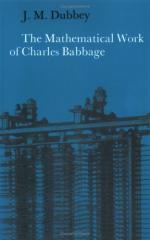|
This section contains 1,407 words (approx. 5 pages at 300 words per page) |

|
World of Computer Science on Charles Babbage
Charles Babbage is considered the creator of modern computers. A mathematician and 19th century British intellectual, he conceived of a steam driven Difference Engine that could automatically calculate and print error-free mathematical tables. He later developed the idea of the Analytical Engine which could be programmed to make calculations and could store results in a memory unit. Babbage also invented the first automated typesetter for printing the results of computations. Although construction of his calculating machines was never completed in his lifetime, his concepts were used as the basis for the Harvard Mark I Calculator, the prototype of the modern digital computer, built by Howard Aiken in 1944.
Charles Babbage was born on December 26, 1792, in Teignmouth, Devon, England. He was the son of a London banker, Benjamin Babbage, from whom he inherited a sizable fortune, enabling him to devote his life to intellectual pursuits. As a child Babbage suffered...
|
This section contains 1,407 words (approx. 5 pages at 300 words per page) |

|


